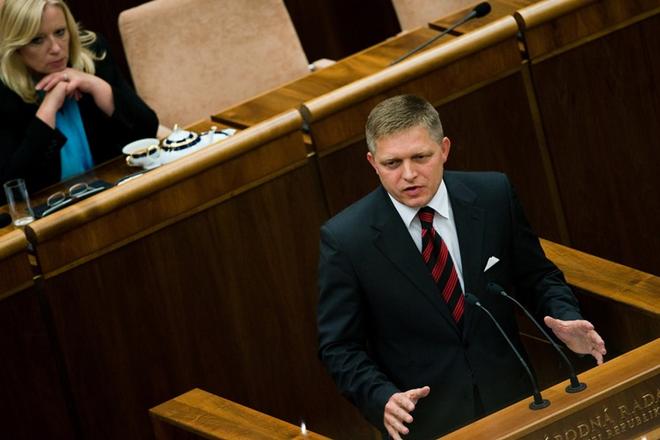OPPOSITION Smer and three of the four coalition parties, with the exception of Freedom and Solidarity (SaS), have been quick to agree on the next developments in the country which has experienced a chaotic day on October 12 following the fall of its government. Meanwhile, SaS, whose MPs refused to support Iveta Radičová’s government in the crucial EFSF vote last night, found itself in political isolation.
Three parties from the former ruling coalition – the Slovak Democratic and Christian Union (SDKÚ), the Christian Democratic Movement (KDH) and Most-Híd – have come to an agreement with the biggest parliamentary party, the opposition Smer, led by former prime minister Robert Fico.
It was Fico who announced at a press conference held on the afternoon of October 12, only hours after the vote that brought down the government, that early elections will be held in Slovakia in March 2012, according to the agreement made with the three centre-right parties.
This agreement promises that the cabinet will propose a constitutional law to shorten the current election term in Slovakia, with an early election scheduled on March 10, 2012. Parliament will pass the law through a fast-tracked legislative process.
Only once the law is passed and early elections are secured will Smer open talks with the three centre-right parties about ratifying changes to the EFSF.
“Slovakia will ratify the bailout mechanism without any problems,” Fico promised, stating that there is consensus amongst the parties that Slovakia must support such a mechanism in the eurozone.
The vote on the bailout mechanism should be held in parliament as early as Thursday, October 13, or Friday, October 14, SDKÚ leader Mikuláš Dzurinda told journalists later that day.
“We had to pay a political price, and the price is early elections,” Most-Híd leader Béla Bugár said.
Regarding the functioning of the cabinet and parliament in the period before the election, Fico stated that Smer will “remain an opposition party until the very last day of this election term” and will not try to strengthen its position in parliament. The functioning of the cabinet is “an internal affair of the coalition parties”, Fico affirmed.
Meanwhile, the SaS, which has been excluded from the talks after Iveta Radičová called on Richard Sulík to step down as parliamentary speaker and the four SaS ministers to leave the cabinet, announced they were ready to attend the next cabinet session, scheduled for Wednesday October 12 afternoon. This session is set to debate the state budget and the reform of payroll taxes.
The SaS ministers and Sulik have repeatedly asserted that they see no reason to leave their posts, as the cabinet has already fallen.
Political analysts have been saying since the failed vote that SaS has thrown itself into political isolation.
“SaS has lost the trust of its coalition partners, and it states it will have nothing to do with the opposition,” Marek Rybář, a political analyst from the political sciences department of the Comenius University, told The Slovak Spectator.
Leaders of the SDKÚ, KDH and Most-Híd, however, still expect the SaS to vote for some of their proposals in parliament, so they are not going to propose any law that would be beyond the scope of the programme statement of the Iveta Radičová government.


